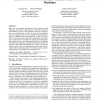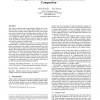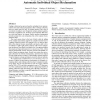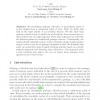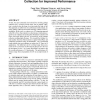VEE
2006
ACM
14 years 3 months ago
2006
ACM
The Pi-calculus is a formalism to model and reason about highly concurrent and dynamic systems. Most of the expressive power of the language comes from the ability to pass communi...
VEE
2006
ACM
14 years 3 months ago
2006
ACM
Many new Java runtime optimizations report relatively small, single-digit performance improvements. On modern virtual and actual hardware, however, the performance impact of an op...
PLDI
2006
ACM
14 years 3 months ago
2006
ACM
The widely used Mark-and-Sweep garbage collector has a drawback in that it does not move objects during collection. As a result, large long-running realistic applications, such as...
PLDI
2006
ACM
14 years 3 months ago
2006
ACM
Garbage collection has proven benefits, including fewer memoryrelated errors and reduced programmer effort. Garbage collection, however, trades space for time. It reclaims memory...
RTSS
2006
IEEE
14 years 3 months ago
2006
IEEE
Memory management is a critical issue for correctness and performance of hard-real time systems. Java environments usually incorporate high-throughput garbage collection algorithm...
ISORC
2006
IEEE
14 years 3 months ago
2006
IEEE
Automatic memory management or garbage collection greatly simplifies the development of large systems. However, garbage collection is usually not used in real-time systems due to...
RTA
2007
Springer
14 years 3 months ago
2007
Springer
We investigate garbage collection of unreachable parts of rooted graphs from a categorical point of view. First, we define this task as the right adjoint of an inclusion functor. ...
OOPSLA
2007
Springer
14 years 3 months ago
2007
Springer
This essay presents remarkable similarities between transactional memory and garbage collection. The connections are fascinating in their own right, and they let us better underst...
OOPSLA
2007
Springer
14 years 3 months ago
2007
Springer
To date, the most commonly used criterion for invoking garbage collection (GC) is based on heap usage; that is garbage collection is invoked when the heap or an area inside the he...
IWMM
2007
Springer
14 years 3 months ago
2007
Springer
Past studies have shown that objects are created and then die in phases. Thus, one way to sustain good garbage collection efficiency is to have a large enough heap to allow many ...

